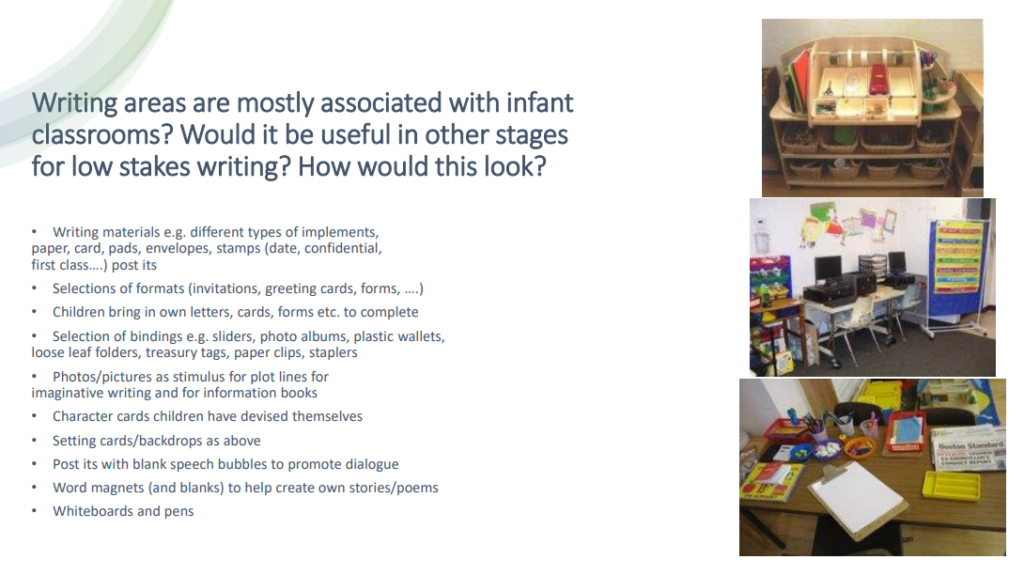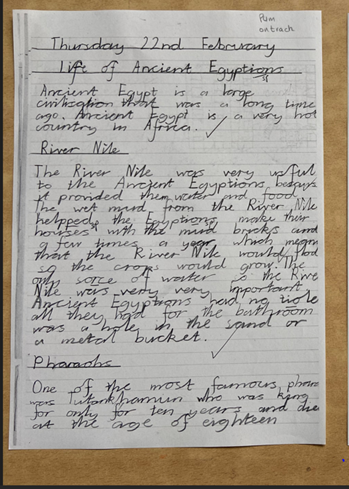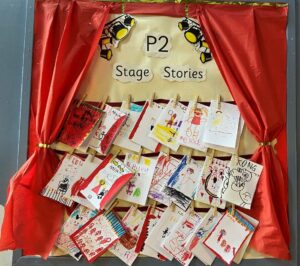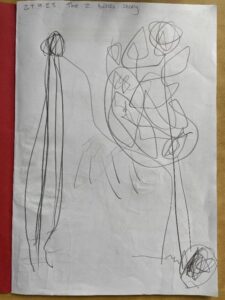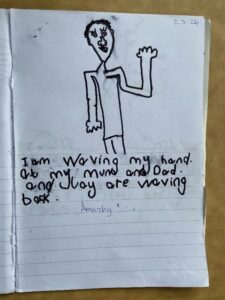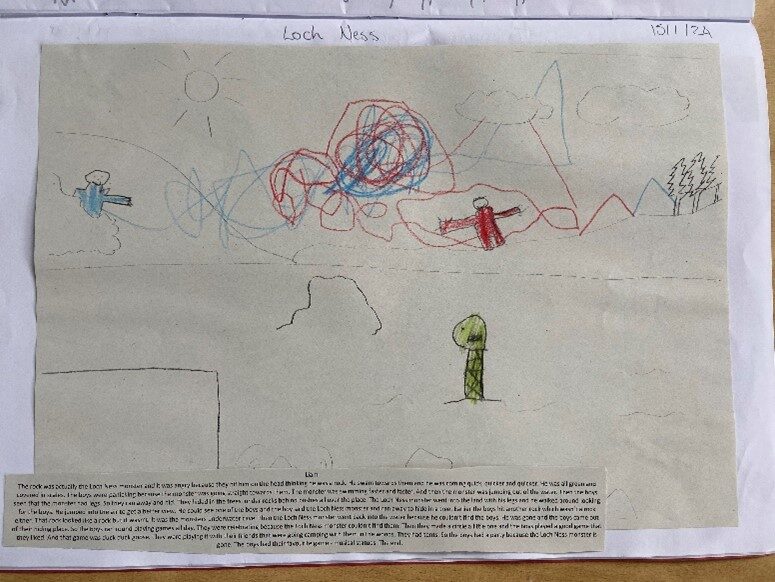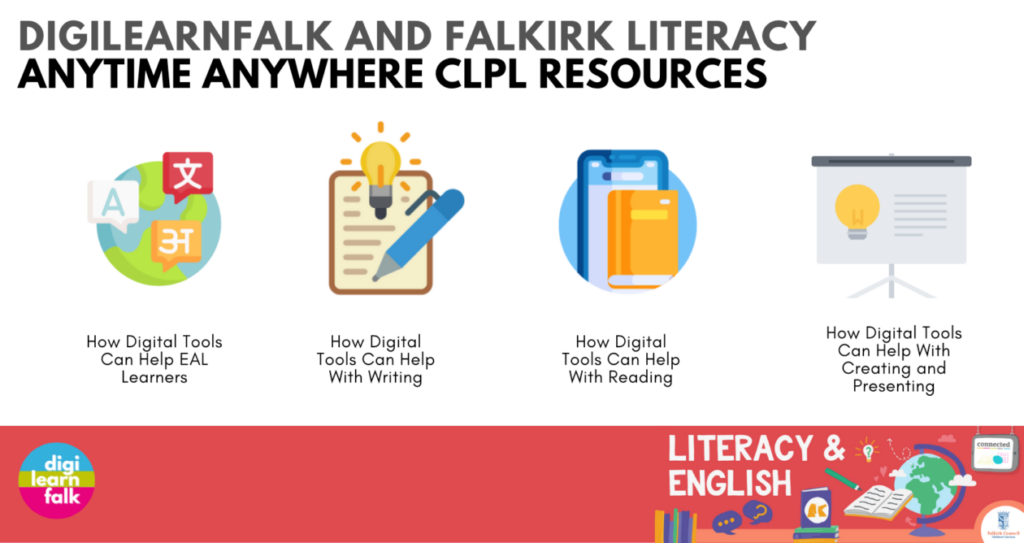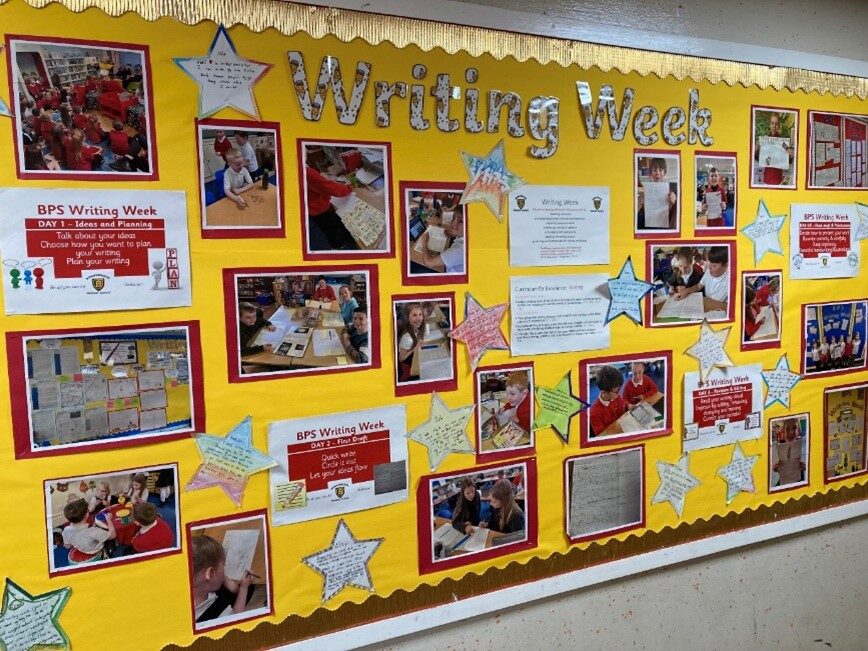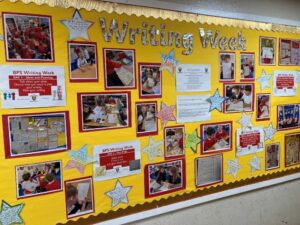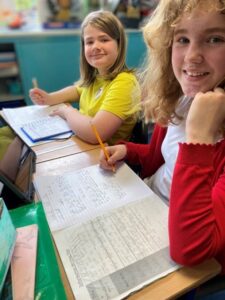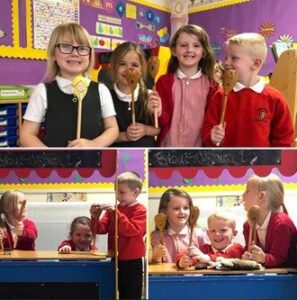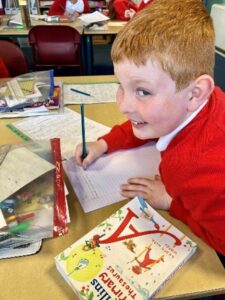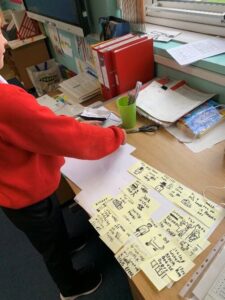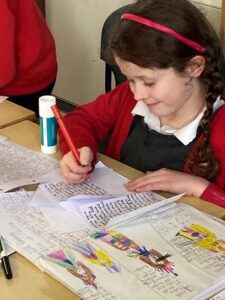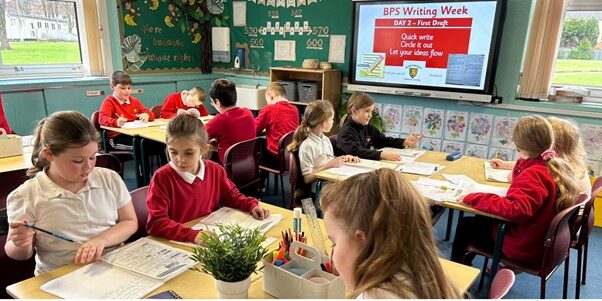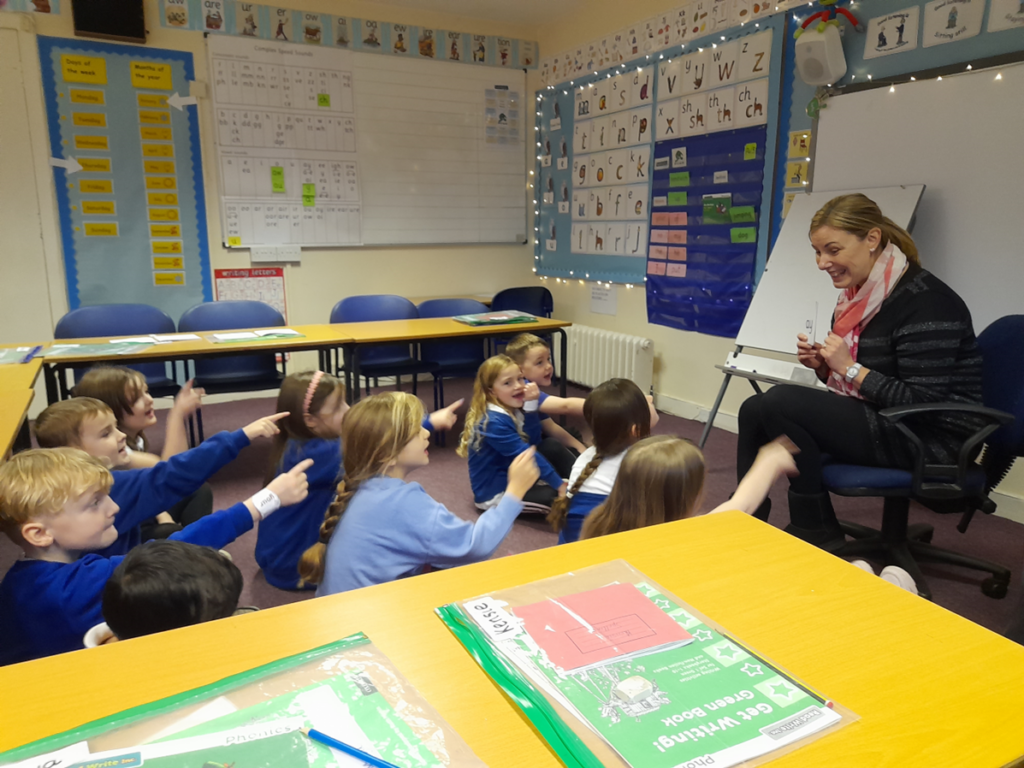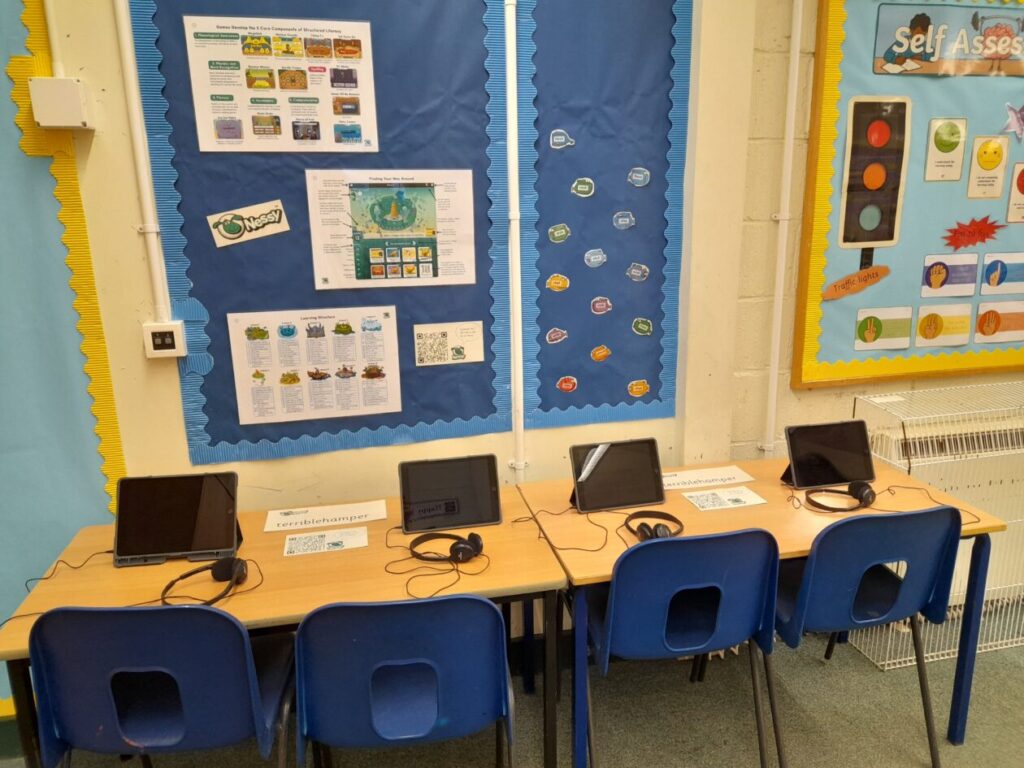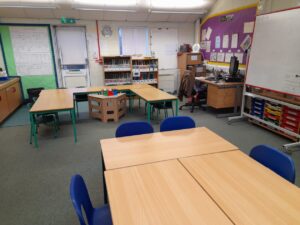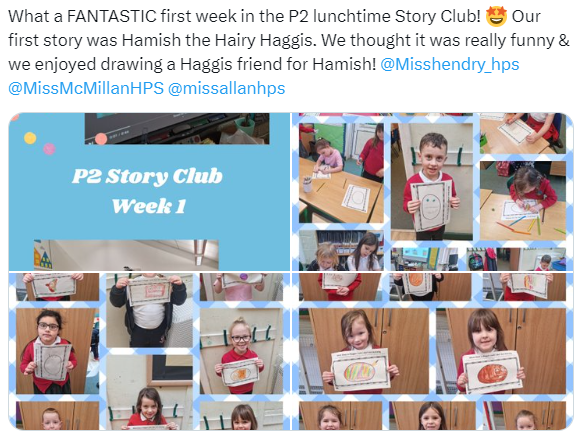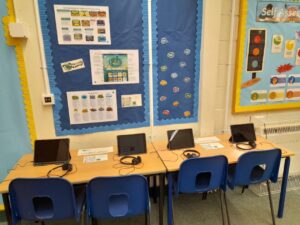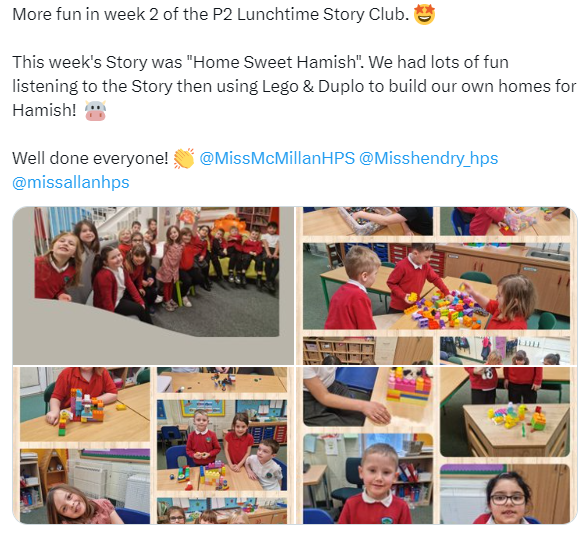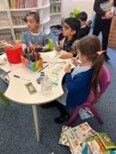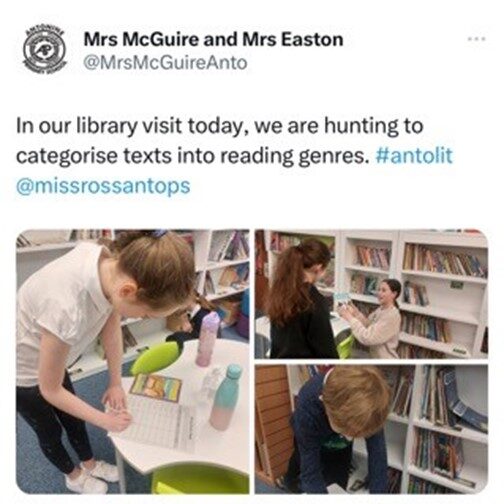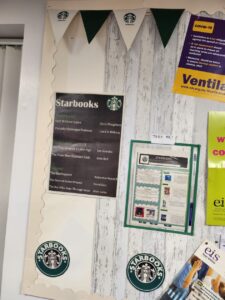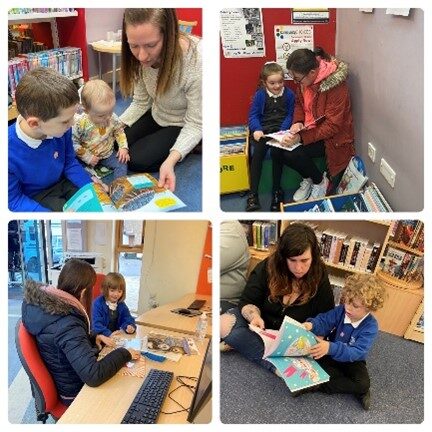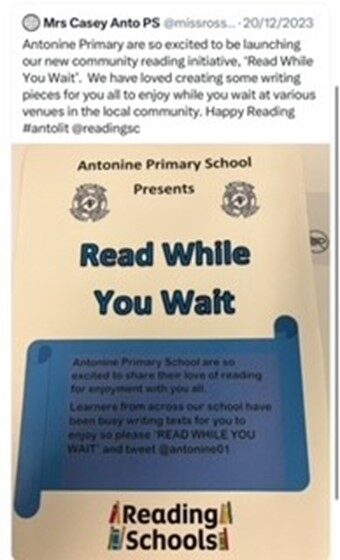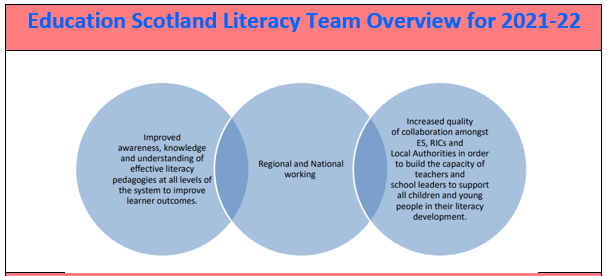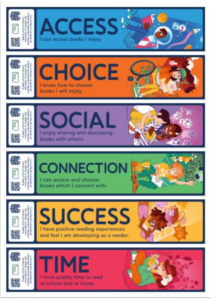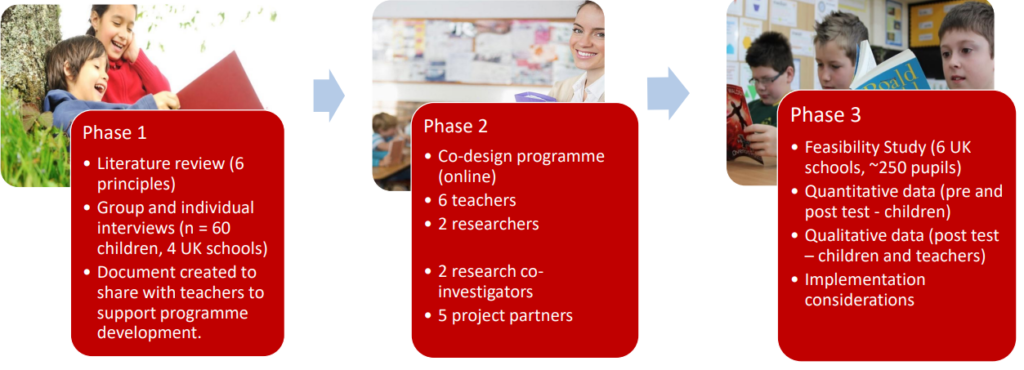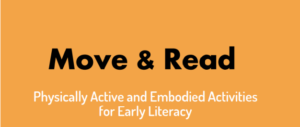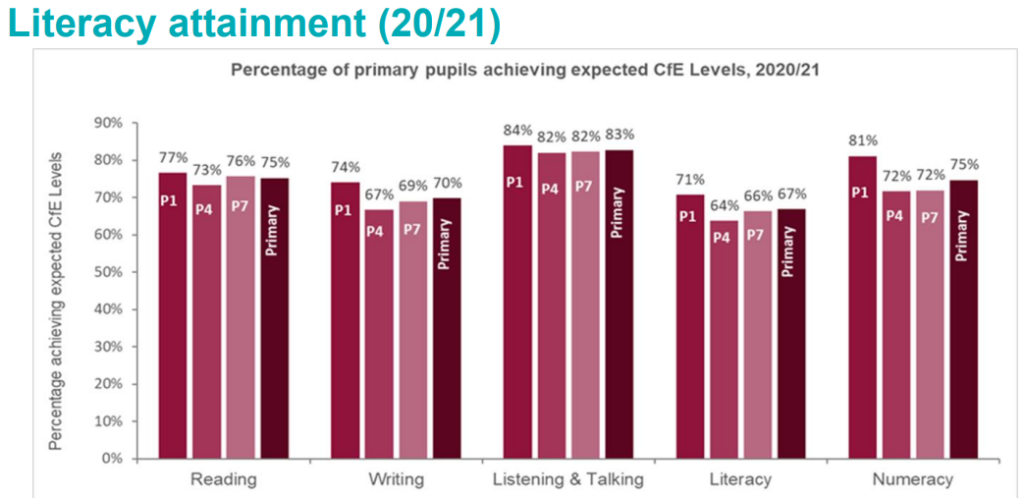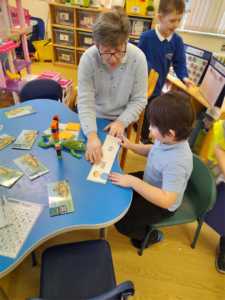
Catharine Gillespie is the raising attainment teacher in Stenhousemuir PS and, with the support of her principal teacher Dawn Easton, she is leading the use of Read Write Inc Phonics (RWI) from primary 1- 4 as a key support for progressing pupils’ reading, writing and spelling. The Read Write Inc Phonics programme is produced by Oxford University Press and Catharine was trained as a reading leader via the Ruth Miskin training programme. All teachers using the programme in Stenhousemuir PS have also been trained and Catharine provides ongoing professional learning and support for them. This training comprises the first three steps of a seven-step RWI programme which also includes:
- Rigorous assessment, tracking and monitoring
- Grouping children for maximum progress based on the above assessment
- Making consistent use of teaching strategies and pedagogy which encourages children’s best learning behaviours
- Supporting parents and carers so that they can contribute to their child’s progress
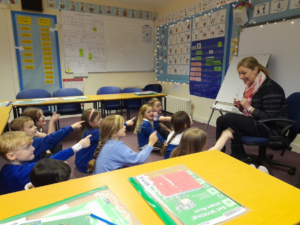
What impact on literacy learning is the use of this programme having?
The current primary 5 children at Stenhousemuir have been developing their literacy skills through this programme since primary 1 and there has been significant improvement in their attainment as a result. Most children across the school are on track with their learning with only a small number needing additional interventions to support their learning differences. Catharine notes that more children are achieving more quickly and measures this impact by comparing the attainment of current primary 2 children with those of previous primary 2 classes prior to using the programme. She attributes this impact to:
- Close Assessment of children’s progress:
Catharine assesses all children at 6-8 week intervals to determine where they are in their learning. Using the assessment resources within the programme, she identifies the consolidation opportunities and new learning needed then adjusts the groups which the children learn within to provide the correct degree of challenge for them.
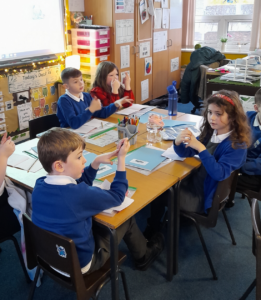
2. Grouping of children:
Primary one children experience the programme within the adult-directed literacy element of their learning day. Fred the frog is introduced to children (the character used to engage children) and then used as a focus for structured teaching strategies across the programme. From January the children are grouped across both primary 1 classes and learn their initial sounds visually through the “Fred Talk and Fred Fingers” procedures, rhymes and visual clues. These procedures are taught in primary 1 and are then used consistently by all teachers working with groups across the school. From primary 2 upwards, Catharine groups the children using their assessment information within mixed class groups. She allocates each group to a teacher and a learning space within the school. The Read Write Inc sessions take place during an hour between play time and lunch time Monday to Thursday of each week. Catherine ensures that no child works in a classroom space which is below their actual primary stage.
3. Pedagogy and teaching strategies used:
The initial training guides teachers’ use of interactive, consistent routines for each part of the daily RWI sessions. Catharine and colleagues use these effectively to ensure that ways of working remain familiar and constant so that children can focus on the new learning. Each literacy session includes the Fred talk exploration of the new sound and teachers make this as multi-sensory and accessible as they can through their dialogue and interaction with their group of children. The Fred Fingers strategy involves children pinching their fingers in time with each of the sounds they hear in each word they see and learn. The teachers use flash cards with words which contain each new sound and a selection of review sounds, in a familiar routine with their whole group.
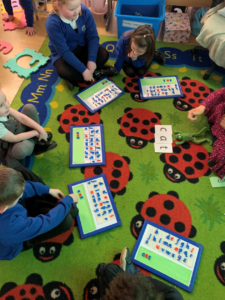
The RWI 1 hour sessions are focussed, with the actual activities and ways of working changing every 15 minutes or so to support children’s focus and engagement. There is:
- Always a review of the learning from the previous day’s work,
- Introduction of the new sound and flash cards as above
- Review of previously taught sounds
- Writing of the letters, sounds and words learned
- 3 readings of the text identified for the group (more detail below)
- A quiz/differentiated comprehension questions
- Linked writing opportunities at appropriate levels
- Proofread and editing tasks
- Grammar and vocabulary challenges
- Longer writing tasks which enable children to apply their writing skills more creatively
The children are prepared for reading by learning the decodable and tricky words they will encounter in the story. They have a lively and engaging story introduction which builds enthusiasm for reading the text and puts the story into a context. Then they do paired reading – each child reading it again in turn. When listening to each other, the children use a lollipop stick as a pointer to guide their partner’s reading. After the first read, they have the text read by the teacher to model confident, fluent and expressive reading. Read two develops fluency and read three focusses on comprehension of the text and voice choice to match
The whole philosophy is that children are given every skill they need to be successful in their reading before they begin. As the children progress in their reading, the levels of challenge in vocabulary increase, as does the length of the text.
All of these activities support children’s ability to:
- de-code the text
- develop their reading fluency
- link the phonemes with their corresponding graphemes
- form the graphemes and
- use the graphemes correctly when spelling.
The texts also have comprehension questions which increase in quantity and difficulty as children move through the levels of the programme.
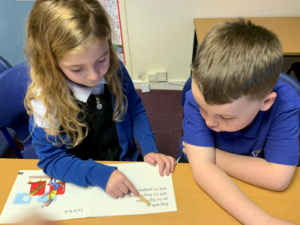
The Ruth Miskin training programme includes the specification of pedagogical/classroom management techniques which support children’s learning behaviours and attitudes. These promote a calm, ordered, focused learning environment and familiar routines and ways of working. Teachers at Stenhousemuir PS use these actions rather than their voices to manage the different procedures involved in each literacy lesson. For example, children learn that when the teacher raises their hand this means it’s time to stop what they are doing and listen for instruction. When moving from one activity or group to another, teachers use a 1, 2, 3 finger signal to manage children’s standing, moving and sitting. These techniques have been so successful that they have become adopted throughout the teaching day for all classes.
What do the children think of this literacy learning?
When asked for their opinions of their teachers’ use of this programme children in two learning groups said:
“It’s not hard or easy” gave thumbs up sign with smile “it’s medium.”
“It’s helping me learn.”
“I like the books – they are nice and good. I feel like I am learning all of the words.”
“The lolly stick helps me see all of the words.”
“ I love Read Write Inc because it helps me to read fast.” – P2
“You have to work hard to learn all of the sounds” – P1
“I read my home reading book to my mum and she is proud of me!” – P3
The teachers feel that as the programme moves up through its levels, it supports specific literacy skills and understanding such as children’s knowledge of alternative spellings for similar sounds and their capacity to proof read and edit their writing. Catharine feels that their use of the programme offers their children small, measured steps to success leading to independent working and the ability to apply literacy skills purposefully across the curriculum.
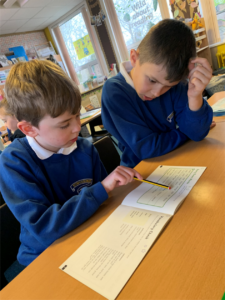
How are teachers adapting and using this programme for their children?
When reviewing their use of RWI, teachers at Stenhousemuir agreed on adaptations to their use of the programme. This included:
- Adapting the assessments provided to be more focussed
- Adding in a Fred Star of the Day award to the child who’d engaged, progressed or contributed well to the daily RWI hour
- Changing the classroom literacy displays weekly to reflect the learning focus
- Enabling children to take Fred home for the weekend (a child in each group does this and provides a simple diary insert for Fred’s adventure book).
On Fridays children’s literacy hour happens with their own class in their own room. Teachers use elements of PM Writing to teach varied and creative writing lessons which enable children to apply the learning they’ve acquired over the previous week.
Ongoing Development and Next Steps
To complement their use of the RWI programme, teachers are also supporting primary 6 and 7 children to catch up on any gaps in their learning by using the RWI Fresh Start programme. Children work in small groups to develop and consolidate their literacy skills, using texts which have a more age appropriate interest level.
Upon seeing the impact of Read Write Inc Phonics in the lower school, the school invested in the Read Write Inc Literacy and Language programme for Primary 4-7 children. This forms part of a language rich curriculum which develops children’s reading and understanding in different genres and builds upon the work done in the phonics programme.
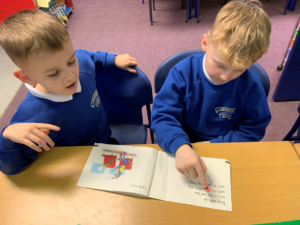
Engaging Parents
It was decided that maximum impact on learning could be gained through the purchase and use of RWI text collections of home readers and speed sound booklets. In conjunction with information night opportunities for parents and carers, these booklets enable parents and carers to support their child’s reading homework tasks. The home readers are matched with the taught content of the RWI texts used in school to ensure that children will experience success while reading. Similarly, the speed sound books enable parents and carers to engage in fun consolidation of their child’s knowledge of their taught sounds at home.
Parents and carers have been very positive about these developments, but Catharine and colleagues at Stenhousemuir PS now want to build on this initial parental involvement in their children’s literacy. They would love to attract or recruit more parental helpers who can work with children in their learning groups.
In summary, staff use of the Read, Write Inc Phonics programme at Stenhousemuir PS is engaging learners, improving reading attainment and enabling children to progress their literacy skills at an appropriate pace. Catharine would be delighted to speak with colleagues wanting to know more, and an information/sharing opportunity will be scheduled via Falkirk CPD Manager before Easter 2024.
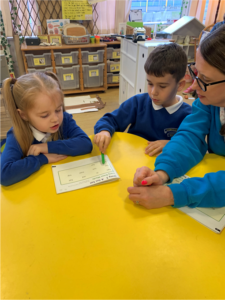

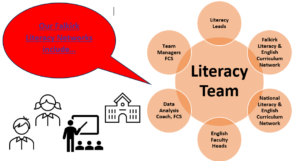

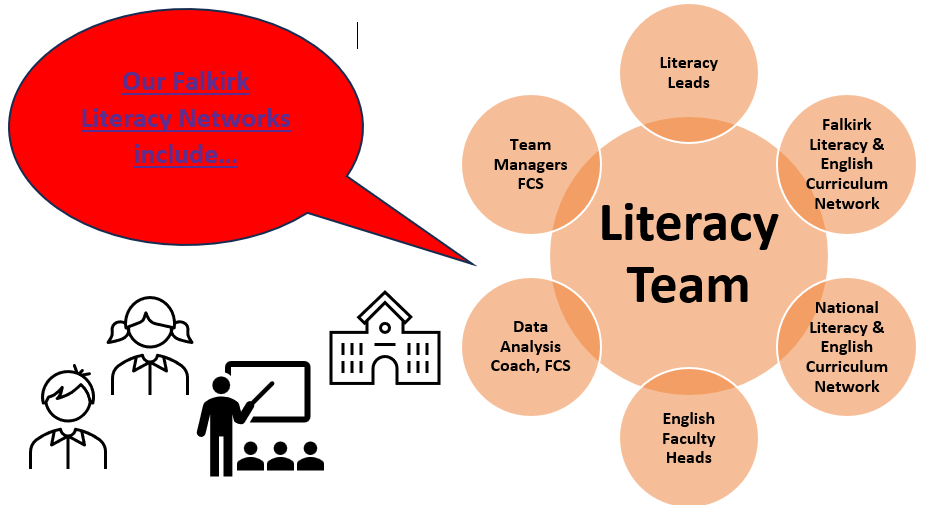
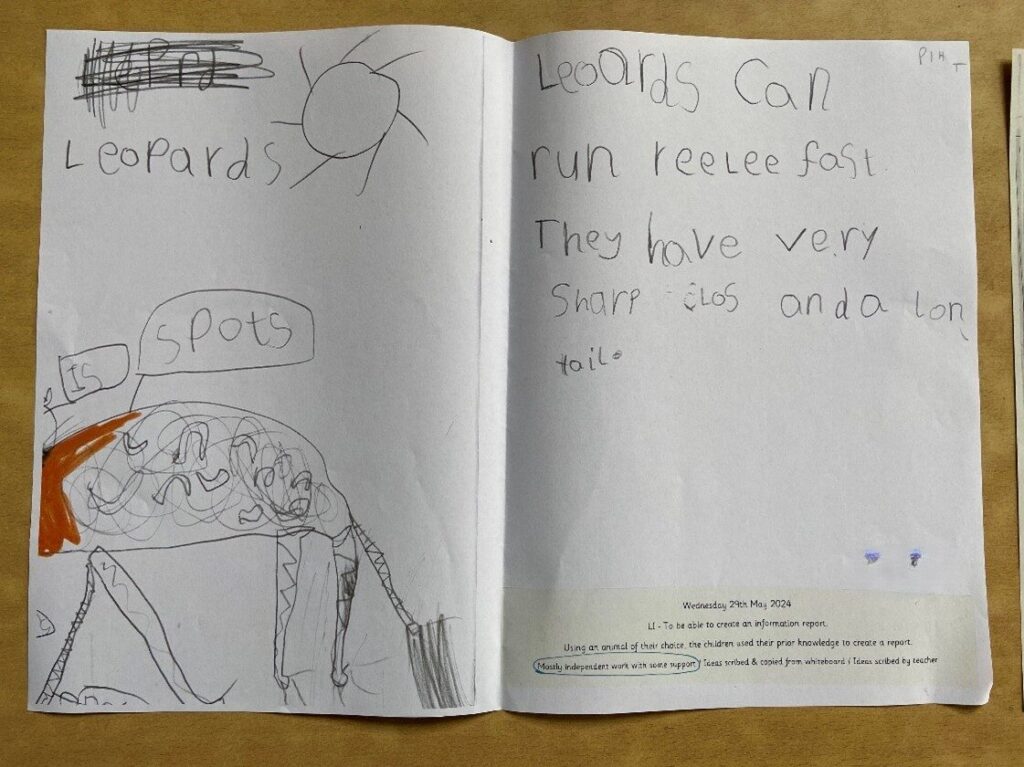
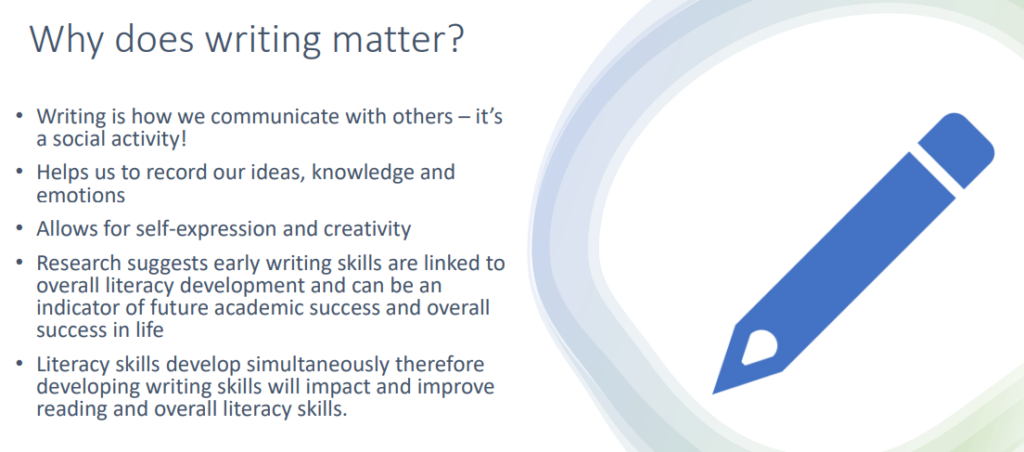
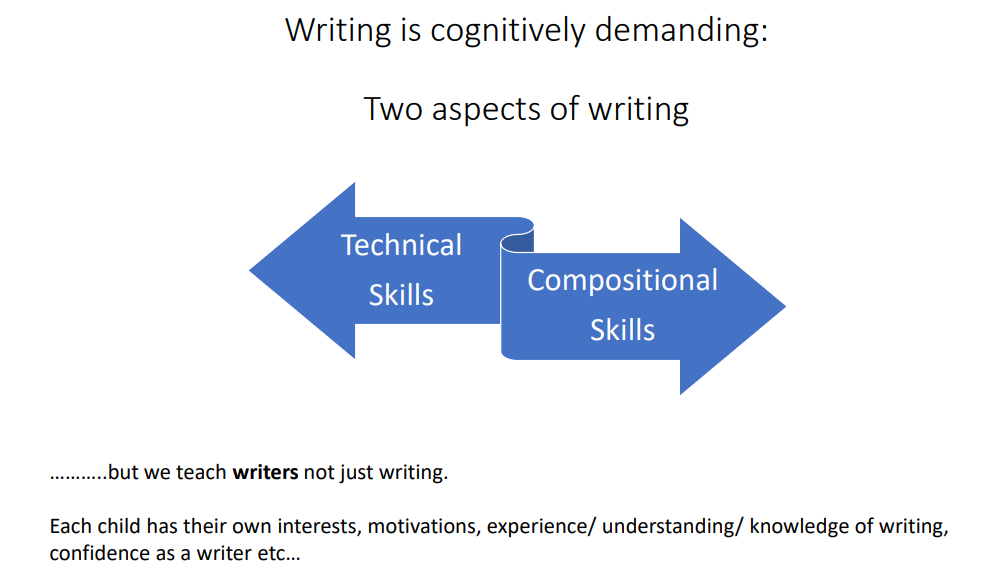 Frances initially facilitated a collegiate meeting with colleagues to share key information about children’s development of writing. This included: why writing matters, the cognitive load required as children learn transcription and compositional skills, teachers’ responses to children’s written work, and the purposes of writing. Falkirk practitioners can view her presentation in more detail in our Literacy in Falkirk Team
Frances initially facilitated a collegiate meeting with colleagues to share key information about children’s development of writing. This included: why writing matters, the cognitive load required as children learn transcription and compositional skills, teachers’ responses to children’s written work, and the purposes of writing. Falkirk practitioners can view her presentation in more detail in our Literacy in Falkirk Team 